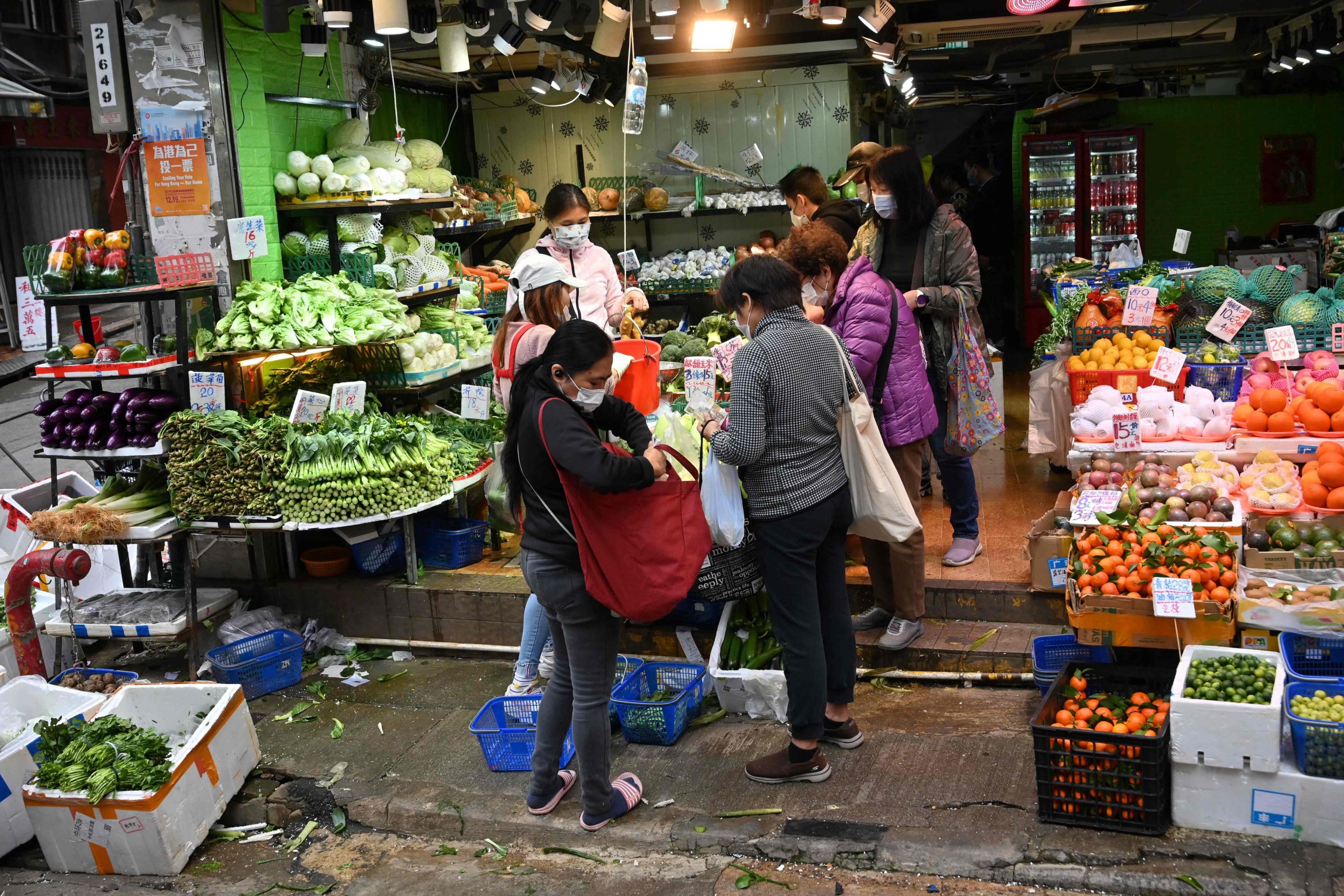Hong Kong food supply at risk again as more drivers get Covid-19
Sign up now: Get ST's newsletters delivered to your inbox

Shoppers buy vegetables a day after many shops ran out of some produce in Hong Kong on Feb 9, 2022.
PHOTO: AFP
Follow topic:
BEIJING (BLOOMBERG) - More lorry drivers responsible for transporting food supplies into Hong Kong have tested positive for the coronavirus at the mainland China border, sparking concerns that the city may be hit by another round of fresh-food shortages.
Nine cross-border drivers have tested positive since Feb 4, including two on Thursday (Feb 10), according to a statement by the border control authorities in the mainland city of Shenzhen.
All places visited by the two drivers were disinfected and the local government has informed Hong Kong about the cases, it said.
While the latest infections have not affected supplies so far, Hong Kong has only just recovered from this week's sudden shortage of vegetables after mainland China temporarily shut border-crossing operations following a handful of positive tests among lorry drivers.
Last weekend's swift crackdown - typical of the rigid measures the mainland imposes to quash potential outbreaks - saw supermarket shelves stripped bare and prices surge as fresh produce supply dropped as much as 70 per cent.
The latest two cases did not use the border crossing designated for fresh food transport, according to Mr Thomas Ng, chairman of Hong Kong Food Council and a fresh produce supplier.
But the logistics industry fears China may step up virus control measures to prevent infections from Hong Kong, which is reporting record daily case numbers, from spilling over, said Mr Chan Fu-chuen, vice-chairman of the Chamber of Hong Kong Logistics Industry.
That would make border checkpoints more congested and affect the supply chain, he said.
Hong Kong relies on mainland China for more than 90 per cent of its vegetables and freshwater fish, and imports a range of other goods from construction materials to home appliances.
Vegetable supply had returned to 90 per cent of normal and was expected to further stabilise, the government said on Thursday. Operations at border control points were smooth and supplies of chilled pork, poultry and eggs remained steady, it said.
A government representative did not immediately respond to a request for comment on Friday.
Still, a sense of caution remains as Hong Kong battles an unprecedented virus outbreak that is set to see a record of more than 1,320 new cases reported on Friday and has prompted officials to seek help from mainland China. Both places are the last global holdouts pursing a Covid Zero strategy.
A Wellcome supermarket branch in the north-western district of Yuen Long is limiting purchases to three packaged vegetables per person per day, according to a notice in the store on Friday.
Some Hong Kong suppliers have cancelled orders for fresh food from the mainland on concerns goods may spoil if they get delayed, the logistics group's Mr Chan said.
Hong Kong officials will ask mainland China for help ramping up its pandemic defenses this weekend, as the city battles a Covid-19 outbreak that threatens its zero-tolerance strategy.
Secretary for Food and Health Sophia Chan confirmed local media reports that the two sides will meet over the city’s spiraling Covid-19 situation at a Legislative Council meeting on Friday.
Officials will convene in Shenzhen to discuss tripling Hong Kong’s daily testing capacity to 600,000 a day, local media HK01 reported late on Thursday.
The Hong Kong side will also ask for help building a makeshift hospital similar to those erected in the central Chinese city of Wuhan in the pandemic’s early days, according to the website.
“Recently, our office has conveyed the central government’s concern about the epidemic in Hong Kong,” the Hong Kong and Macau Affairs Office said in a Thursday statement, confirming the meeting. “The mainland will fully support Hong Kong in fighting the fifth wave of the epidemic.”
Chief Secretary John Lee will lead the delegation and be joined by Secretary for Constitutional and Mainland affairs Erick Tsang, the Hong Kong Economic Times reported.
In the first eight days of February, average wholesale prices of some of the city's most common winter greens was HK$19 (S$3.28) per kilogram, double a year earlier, according to government data.
Higher grocery costs are likely to have an outsized impact on Hong Kong's poor, with almost a quarter of residents living in poverty.
And the risks extend beyond food. Some mainland factories have rejected Hong Kong drivers from entering facilities, fearing a potential infection may lead to shutdown of their operations, according to Mr Chan.
"The situation is very bad," he said. "If more infections are found among drivers, Shenzhen may further tighten control measures and the worst may be yet to come."

